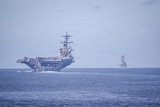US Coast Guard might not have surface assets to patrol the Arctic this summer
The only USCG icebreaker operating in the area, Healy had an electrical fire and had to return to its home port. (Photo: US Coast Guard)
In desperate need of budget and new capabilities to maintain its operations worldwide, the US Coast Guard (USCG) might not be able to protect the Arctic territorial waters over the coming weeks and months from Russian and Chinese ambitions towards the area.
During a recent patrol in the north of Alaska, the Healy medium icebreaker, the service’s single extreme cold temperature asset operating in the region, had an electrical fire and had to return to its home port in Seattle, Washington.
Meanwhile, on 9 August, the USCG announced that the Cutter Alex Haley had detected a Russian Vishnya-class naval
Already have an account? Log in
Want to keep reading this article?
More from Naval Warfare
-
![As Indonesia doubles up its order, who else is looking at the Arrowhead 140 frigate design?]()
As Indonesia doubles up its order, who else is looking at the Arrowhead 140 frigate design?
The adaptable design of Babcock’s Arrowhead 140 frigate, already selected by the UK Royal Navy and Poland, has led to more orders from Indonesia while other countries continue to weigh it up.
-
![Does the increase in US firepower in the Middle East indicate another Iran strike?]()
Does the increase in US firepower in the Middle East indicate another Iran strike?
The presence of the USS Abraham Lincoln Carrier Strike Group in the Persian Gulf means additional naval and aerial capabilities, which provides the US with multiple attacking options.
-
![US Navy to invest more than $700 million in laser-related R&D efforts in FY2026]()
US Navy to invest more than $700 million in laser-related R&D efforts in FY2026
The US Navy’s acceleration of its laser weapon development initiatives reflects a decisive shift towards ultimately having a “laser on every ship” across tomorrow’s surface fleet.





















